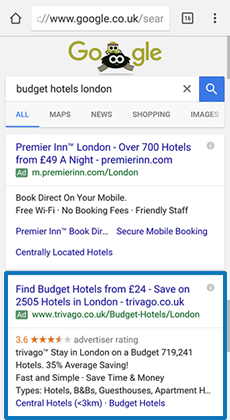3 min read
Honchō Scoops Up Two UK Search Awards!
It’s official, we've added not one, but two shiny trophies to our awards cabinet! We’re over the moon to share that we’ve triumphed at the UK Search...
In February 2016, Google made a significant change in the search engine result pages (SERPs) by displaying four PPC Ads on top and moving the rest to the bottom of the page. This was quite a bold move from Google and there has been a wave of nervous uncertainty rising from parts of the SEM industry about the scale of the impact on organic search. However, the reality is that we are yet to see any significant negative influence on organic traffic.
While industry experts are still adjusting to this change, Google has shaken the industry again with their new expanded ads that are currently being rolled out. The new ads offer almost 50% more ad copy which is likely to push the organic search results down further.
Unlike the SERP shake up in February 2016, this change is likely to have a significant impact on organic results, especially on mobile where the screen size limits the number of ads above the fold (snapshot below). That said, this is just speculation at this stage while we wait for industry experts to crunch the relevant data and measure the impact of these changes.
We are keeping a close eye on the impact of these expanded ads on our paid media but early results have not shown any significant impact on CTR across our clients. You can read this post from Search engine land on what expanded ads are and their impact on paid ads across various industries.

One thing is clear from this change and that is that the SERPS will look completely different to how they appear now. We all know that in the future ten blue links will not really matter. Google has been experimenting with various SERP formats including cards, answer boxes, carousels, rich snippets and local packs for some time. All of this has been made possible due to their ability to understand data and content better than ever before.
As digital marketers we should start thinking long term and prepare ourselves for these changes in the best way possible. Make sure your site is helping Google and other search engines understand the context by using schema mark-up, use of entities, concepts and not just relying on keyword research.
As scary as it sounds, it’s important to remember that modern SEO is all about creating data-led strategies to connect with your audience. Yes, its turbulent times for SEOs, especially in competitive industries where top 3 positions will get even more competitive if Google keeps pushing the organic results further down. However, if we continue to do what’s best for our audience, it will be even harder for search engines to ignore SEO.
Schema mark-up is still quite under-utilised and should be used to provide context about your organisation, your products and services. The goal here is to give Google a better understanding about what you offer to your audience. You can find all types of schemas you can use on your website here.
If you are an eCommerce business, then make sure you are using mark-up on all product pages and if you are a publisher than you should utilise schema for organisation, social media profiles, news articles, events and blog posts.
Example below:
{
"@context": "http://schema.org",
"@type": "Organization",
"name": "iThinkMedia",
"legalName": "iThinkMedia",
"url": "https://www.honchosearch.com",
"logo": "https://www.honchosearch.com/wp-content/uploads/2012/04/contact-itm-logo.jpg",
"foundingDate": "2008",
"founders": [
{
"@type": "Person",
"name": "Christopher Ailey"
}
],
"address": {
"@type": "PostalAddress",
"streetAddress": "2 Cole Green",
"addressLocality": "Hertford",
"addressRegion": "Hertfordshire",
"postalCode": "SG142NN",
"addressCountry": "United Kingdom"
},
"contactPoint": {
"@type": "ContactPoint",
"contactType": "Customer Support",
"telephone": "+441438870220",
"email": "hello@honchosearch.com"
},
"sameAs": [
"https://www.facebook.com/HonchoSearchUK",
"https://twitter.com/honcho_search",
"https://www.linkedin.com/company/honchosearchuk/",
"https://plus.google.com/+iThinkMediacouk/posts"
]
}
For a well-known brand, chances are that Google will have gathered a lot of information through a number of sources (mainly Wikipedia). However I would still suggest using mark-up to avoid any confusion. If you are a local business with a relatively small to medium setup, you will have to provide as much context to Google as you can and Schema mark-up is one of the best tool for that.
Search needs always feed into your content strategy as one data point but an effective strategy is incomplete without first party consumer data, survey results (both 1st party and 3rd party), social listening tools, interviews etc.
Keywords are still important and will remain so for the foreseeable future and while they are a good source of insight for content ideas, your strategy should always be based on the pain points of your audience .
Targeting long-tail keywords means less competition and more real-estate coverage for organic search results.
Here’s a very useful resource on how Gov.uk approaches content strategy – Content design starts with the user need.
Once the strategy has been defined, a single content calendar should be produced and used across all channels. It takes time to understand what type of content resonates well with your target audience. Here at iThink, we use a test and learn approach for each client / industry to improve our ideas and amplification mechanics.

According to the latest report by Flurry, the British and French spend almost twice as much of their time in messaging and social apps, versus in games, at approximately 40% of total app time.
Other than social apps, UK consumers spend a lot of time in news, maps, weather, finance and shopping apps. Having an app is important but before creating one, it’s crucial to understand…
An effective ASO strategy revolves around findability, look and feel and how it’s rated.
App title, description and keywords are important factors and can be easily controlled compared to ratings and reviews, which is dependent on the experience of app users. Whether you are optimising an app for Google Play or Apple store, keep your titles short and think about the following when writing your title and descriptions,
There is already so much said and written on this topic so I won’t go into the details of how important of local search is. The fact is that as Google and other search engines are getting better at understanding searchers’ needs, local optimisation can no longer be ignored, especially bricks and mortar businesses.
Optimising for Google business centre and Bing maps is only a part of your local optimisation strategy. Brands should take full advantage of media partnerships at a local level and ensure all owned assets are fully optimised for local searches. Travel, recruitment, food delivery and dealership networks are the best industries to take advantage of the local search.
Site speed and Click-through rates are already fast becoming the most important factors as search engines push for a better user experience. Free tools like Google’s page speed test and GTMatrix are some of the best tools around to test your page load times. I recommend Lara Hogan’s Weighing Aesthetics and Speed, which is one of the best resources on the basics of improving page load times.
AI and machine learning are the hottest topics in digital marketing these days especially when Google announced RankBrain as one of the top three ranking factors. It is hard to imagine that search engines don’t factor in CTR and bounce rate as signals of relevancy even if it’s an indirect signal. Rand carried out some tests on CTR which may not be accurate as it’s so difficult to carry out a test in isolation once content is exposed to the internet.
Eric Enge wrote a piece on why CTR isn’t a direct ranking signal which Rand witnessed first hand. His CTR experiment could have been easily influenced by Google’s freshness algorithm trying to rank trending topics.
Regardless of whether CTR is a direct or an indirect ranking signal, SEOs should test different headlines just as PPC do to make the results highly relevant to searcher’s query.
Whether we come to search engines to find relevant information or future personal assistants fetch this information for us, there will always be a need for hubs that are considered authority on various subject matters.
The list of areas mentioned above is not exhaustive at all and every topic is so broad that one article is not enough to cover these topics. Nevertheless if you have strategies across all these areas, you don’t have to worry too much about how results are displayed in Google or other search engines.

3 min read
It’s official, we've added not one, but two shiny trophies to our awards cabinet! We’re over the moon to share that we’ve triumphed at the UK Search...

5 min read
Understand ecommerce attribution models which attribution models can maximise your marketing efforts and ROI.

3 min read
Explore how social commerce is changing the way we shop online, blending social interactions with digital commerce for a seamless buying experience.